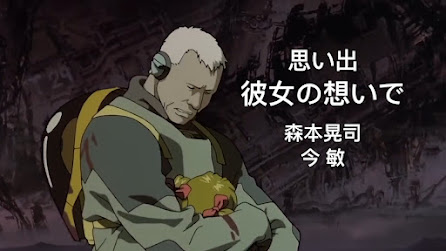Amateur Recommendation Hour: Terror In Resonance
Today’s recommendation is one of the more underrated and under appreciated works in the medium of anime. As time goes by and the medium becomes more homogenized to accommodate larger, broader, audiences with a more diverse range of taste and expectations, I admire this work's ability to be unique and flooded with auteurism. I'd expect nothing less of its creative team. One that comes especially recommended to newcomers of the medium looking for more substance in their art.
Terror In Resonance, directed by Shinichiro Watanabe, is a briskly paced, heart racing, and thought provoking thriller that packs plenty of narrative punch. In an alternate version of present-day Japan, Tokyo has been rattled by a terrorist attack, a rarity in any era of Japan let alone the modern era, and the only hint to the identity of the perpetrator is a bizarre video uploaded to the internet. The police are have been rendered powerless to stop the paranoia spreading across the population by the strange clues left by the alleged culprits. A ragged detective is tasked with uncovering the plot, the means through which it is being carried out, and what the motivation is.
We experience the narrative through the perspective of both the aforementioned detective and the terrorists, mere teenagers, enigmatic and mysterious in their motives and backstories with equally strange names of “Nine” and “Twelve.” Their personalities smartly contrast with each other allowing them to bring out the most authentic in each other in their interactions. While Nine is a pragmatic, stoic, cold and calculating meticulous planner whereas Twelve is a more happy go lucky, bubbly and gentle. Joining them later is the runaway Lisa. Dejected and beaten by her emotionally and physically abusive and controlling mother, she seeks refuge wherever she can find it, even amongst the terrorists themselves.
Its ability to use its very short run time very effectively is something I’ve always been impressed by. With a total of 11 episodes under 30 minutes each you'd think it would be unable to effectively develop characters or flesh out backstories in any kind of meaningful or impactful manner while also attempting to keep up a brisk pace and narrative focus. But in many small moments such as internal monologues, little pieces of conversation, and shots that only last a couple of seconds, Watanabe and his team is able to communicate a remarkable amount of information about who these people are, making them more than just cardboard archetypes that push the narrative forward, especially impressive given how much of a laser focus the story is given.
Personally speaking I really enjoy when importance and context is given in small, understated moments like these, with a show that's on a short leash in terms of time it is the smartest way to add these sorts of details, especially when pacing and narrative is at the forefront, keeping the characters grounded as real people in this manner is no small feat. Whether it be the “old-dog” of a detective in Shibazaki, dragged out of the cellar of shame when the police prove incapable of deciphering the riddles, or the trio of teenagers, momentary facial expressions or through believable choices they might make, regardless of how much they apply to the narrative, it goes a long way in making us care about the events taking place. They each have important moments that juxtapose what we know of them. It’s in those believable inconsistencies that who they truly are starts to come into focus.
The score is also composed by The Goddess Of Music™ and frequent Watanabe collaborator, Yoko Kanno and as those familiar with her work would expect, it’s unique, it's haunting, ethereal, and it’s utterly fantastic, possibly the highlight of the entire show. The soundscape is just as much of a player in the narrative as the characters and story beats are. Fast-moving, cavernous, and a cavalcade of driving guitars echoing into the atmosphere. Stealthy, electronic synths and percussive beats conveying an undercurrent of subversion, commitment, and conflict. The emotional drive exists beyond direction and dialogue, its personality is reflected in music too.
I believe this show to be about how Japanese youths feel they are unable to have themselves be heard or taken seriously by the old guard establishments/institutions, having to take methods into their own hands by morally questionable means. When one is consistently unheard, stepped upon, disbelieved, and beaten down upon by those above them, how are they expected to react with perfection in their communication, grace, and humility? They will eventually feel they must fight if they cannot fly. And those who force them to fight in the only way they are able to cannot claim moral superiority for whatever happens unless they are willing to admit their transgressions.
Japan’s relationship with the United States and nuclear weapons since World War II is one that has developed and evolved significantly since they were the greatest of adversaries in humanity’s biggest conflict. The atomic bombing of Hiroshima, the flashpoint that it was not just in World War II but in the complete history of humanity is one that still echoes to this day, and it is still a defining characteristic of the dynamic between the two countries to this day. And that moment still imbues the US government with a sense of “ownership” over Japan. That it has the authority to intervene as it did many decades ago.
Especially given its subject matter, these are sensitive topics handled with care, intellectualistic intent, and deep yet understated personality. It’s a thematically sizable package that I believe goes beyond even the bite-sized interpretation I've given here. To those who love digging into their narratives beyond the surface, this is an excellent show for you to sink your teeth into. And one that I would argue is Director Watanabe's most intelligent and cerebrally driven work to date.



Comments
Post a Comment